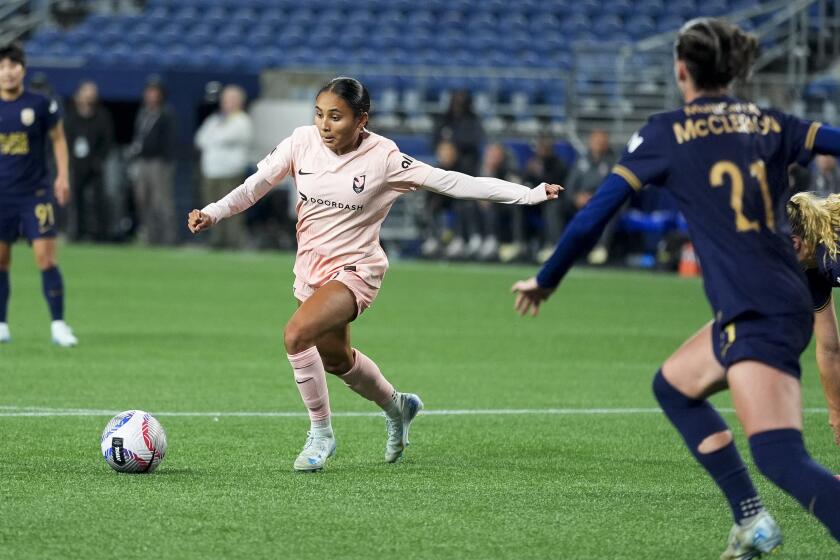Last Hurrah
- Share via
HERAKLION, Greece — It won’t end here, not on this sun-baked island of Crete, not today, not against Germany.
The journey that Joy Fawcett, Julie Foudy and Mia Hamm began all those many years ago still has miles to run. The trio will retire after the Olympics, and might well be joined by Brandi Chastain and Kristine Lilly, but this is not where it ends.
The five were there at the beginning, in China in 1991 when the United States won the first FIFA Women’s World Championship, a tournament that later came to be called the Women’s World Cup.
They were also there in 1996, winning the gold medal at the Atlanta Games in the first Olympic women’s soccer tournament, and again in 1999, when they won their second world championship in dramatic fashion at the Rose Bowl on Chastain’s memorable penalty kick.
They are the last of the “ ‘91ers,” the players who helped put the game they love on the sporting map.
Others have already moved on, such legendary players as Michelle Akers, Carin Jennings Gabarra and Carla Overbeck.
Now, the lives of the last five are about to turn a corner and move in new directions.
Fawcett, the unflappable defender, will be able to spend time at home in Southern California with her three daughters, Katelyn Rose, Carli and Madelyn Rae, instead of taking them with her to tournaments around the world, including these Games, as she has for the past decade.
The “ultimate soccer mom” can finally become simply a mom.
Foudy, the heart of the midfield and the heart of the team, will also go back to Southern California, her future uncharted but undoubtedly involving leadership in some shape or form.
“Loudy Foudy,” captain of the team for the past decade, has been vocal for too long to be silent now.
“I had a dream last night that I was chit-chatting with John Kerry,” Foudy said the other day at the team hotel, laughing at the notion. “Maybe I’ll work on his campaign.
“I don’t know where that came from. I woke up this morning and I was like, ‘That was odd.’
“I have a couple of friends working on his campaign. I was like, ‘This is fine. That’s what I’m going to do after the Olympics.’
“No, I don’t know what I’ll do.”
Hamm was the baby of the team when she first played for it as a 15-year-old on Aug. 3, 1987, the same date that Fawcett and Lilly made their international debuts. She will be heading for a new home in Chicago, her husband, shortstop Nomar Garciaparra, having been traded to the Cubs from the Boston Red Sox just before the Olympics.
“I don’t know what I’ll do,” she said, echoing Foudy. “I hope to have some opportunities, but at the same time I’m not too nervous about it. It’s not keeping me up at night. It’s actually kind of nice not having to worry about that.”
Chastain has said she wants to continue playing, at least until she reaches 200 international appearances. She is at 180 right now, far behind world record holder Lilly, who has 281.
Lilly might retire or might keep going; she isn’t sure.
“I could be done after the Olympics,” she said. “I just haven’t had that feeling yet. I don’t think I’ll make another World Cup, that’s just too far, but who knows? I just don’t feel ready yet to say the words.”
The five came into the Athens Games knowing that it would be their last world event together after an incredible 16 years. They have purposely tried to keep the emotions in the background and to focus on the present, not the past or, more interestingly, the future.
“We’ve really tried to stay away from, ‘This is our last practice together’ or ‘This is our last breakfast together,’ you know, those kinds of ideas,” Foudy said before the team left the United States for Athens.
Hamm underlined the idea once the team arrived in Greece.
“You don’t want to make it into this melodrama,” she said.
All the same, the other players on the team recognize that they are part of something special, the last few performances in a long-running, hugely successful play.
“You can tell from the aura around them that they know this is their last world event,” striker Abby Wambach said. “It’s almost infectious. I feel like they’re trying to let it seep into everybody else. Because nobody else knows what they’re going through. Nobody else can feel what it feels like to go through something for the last time.”
Hamm, in particular, keeps her feelings close to the surface, the tears never being far behind the smile.
“You always have to be careful because emotions are amazingly wonderful,” she said. “I mean, I’m an emotional person. They allow me to feel the way I do about this game and about my teammates and about people in my life, but they can also be inconsistent.
“You want to make sure that you use it as motivation, you don’t want it to make you not be able to perform like you want to perform.
“I think the environment in and of itself is pretty emotional, and to try to pile more on to it than needs to be could possibly just make it harder to perform. I don’t want to do that to myself and I definitely don’t want to do it to my teammates. I think they understand that for a lot of us this is our last Olympics. I don’t need to shove it in their face.”
So far, the five have kept their focus and have consistently been among the best players on the field.
It was quite a statement when all five played the full 90 minutes in the quarterfinal win over Japan, a statement that today’s semifinal opponent, Germany, will have noted.
“They’re the heart and soul of this team,” Wambach said. “They’re what keeps this train running.”
Hamm, in particular, has been inspirational in her last few scenes on the international stage.
“She works so extremely hard,” Wambach said. “You can see it. She’s an intense player. Everybody knows that by looking into her eyes when she’s on the field. When she’s running around, there’s like this fire that comes out of her ears, it almost looks like.
“I love that. It’s inspiring to me. It’s inspiring to people in the stands. It’s inspiring to people back home in the United States.”
The five want to go out with the gold medal.
“It doesn’t matter if it’s our last Olympics or if it was our first, we want to do well,” Foudy said.
“I think as a player you just want to make sure that, whatever happens, you don’t look back and think, ‘Could I have helped more? Could I have done more?’ But that’s how we’ve always been.”
And from Hamm: “That’s how you want to go out, on a high note, on a winning note.”
Thursday night will tell. And whether it’s a gold medal, a silver, a bronze, or no medal at all, there will be tears.
An era will have come to an end.
“It’s hard to believe that it’s been 17 years,” Lilly said just before the team arrived in Greece. “People ask, ‘Can you summarize it?’ and you really can’t because there’s been so many great moments and so many great people are part of it.
“All I can say is that it’s been an amazing time, and one that I would never change.”
*
(BEGIN TEXT OF INFOBOX)
Five Still Fighting
Only five players who helped the U.S. women’s national team win the 1991 World Cup are playing today in the Olympic tournament:
*--* Name Age Position Games Goals Debut BRANDI CHASTAIN 36 Defender 180 30 June 1, 1988 JOY FAWCETT 36 Defender 238 27 Aug. 3, 1987 JULIE FOUDY 33 Midfielder 261 44 July 29, 1988 MIA HAMM 32 Forward 265 153 Aug. 3, 1987 KRISTINE LILLY 33 Midfielder 281 97 Aug. 3, 1987
*--*
NOTE: Hamm’s goal total and Lilly’s game total are world records.






